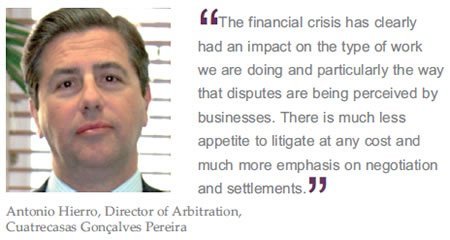Temperatures rising: the dispute management challenge – Litigation & Arbritation Report 2010:
Iberia’s lawyers report that the financial crisis is clearly having an impact on the nature and volume of disputes now being seen. The downturn is bringing more business pressures and commercial relations are under greater strain. That said clear challenges face parties in dispute, say experts. For cross-border and international conflicts, businesses continue to prefer the neutrality of arbitration. Domestically however, many of the same businesses prefer the courts.
Despite the slowness and relative inefficiency of Spanish and Portuguese litigation, lawyers are realistic that efforts need to be maintained to convince businesses to choose arbitration or other forms of alternative dispute resolution in a domestic setting.
Two clear characteristics are evident in the nature of the disputes law firms are now experiencing, says Antonio Hierro, Director of the Arbitration practice at Cuatrecasas Gonçalves Pereira.
“The financial crisis has clearly had an impact on the type of work we are doing and particularly the way that disputes are being perceived by businesses. There is much less appetite to litigate at any cost and much more emphasis on negotiation and settlements.”
Clients and law firms are having to adapt to the new economic and business reality. This can impact both sides of a dispute, say lawyers. Parties increasingly want to avoid the cost of litigation but also to ensure that any entity against which an award is made, is able to pay.
“The best response to the new environment in contentious matters is to act sooner and faster, being always very attentive to the conduct of business partners, debtors or borrowers,” says José Miguel Júdice, name partner at PLMJ in Lisbon.
Manuel Barrocas at Barrocas Advogados in Lisbon agrees: “The advice to clients is to act fast, proactively and with a strong practical approach to the current realities. Focus should be placed on the pre-litigation phase and trying to resolve the case out of court. Never will the famous saying ‘a bad settlement is better than a good court case’ be truer than in the months to come.”
Strategic disputes
Firms unanimously report that dispute practices are running at capacity, even over-capacity. An increase has been seen in employment, insolvency and restructuring, debt collection and general commercial litigation and arbitration. There may be many more finance and commodity-related disputes, but this does not necessarily mean that the absolute volume has increased, say lawyers.
“There is clearly less money for litigation so there has been no dramatic upturn in disputes. It is more that the types of actions we now see have changed. There are obviously a lot more issues emanating from the crisis,” says José María Alonso, former Managing Partner and now Of Counsel to Garrigues.
Nonetheless, some lawyers report parties using litigation as a tactical weapon. “Company disputes are rising dramatically although creditor disputes are the star. Litigation associated to insolvency proceedings are also increasing. In addition, claims are getting more complex than ever. The reason being that many disputes are mere devices to avoid complying with pending obligations,” says José Luis Huerta, partner at Lovells in Madrid.
A recurring challenge is to continue to help clients through such times and in the most difficult situations. “Companies who have never or very infrequently encountered disputes on this scale will suddenly feel the effects first hand,” says Ignacio Díez-Picazo, disputes partner at Herbert Smith in Madrid.

But a more pragmatic approach to disputes by clients is also generating new pressures on the way law firms bill clients. “A clear development has been the financial effects of the crisis on what clients are willing to pay and how they now approach the issue of costs. The billable hour is now clearly dead,” says David Arias, Head of Litigation and Arbitration at Pérez-Llorca in Madrid.
The cost issue is definitely out there and clients are not looking to waste resources on litigating low value disputes, say others. There is a balance between what is being spent and the risks involved.
“We see clear pressure, on fees and the demand to negotiate and where appropriate settle disputes. Clients are in some cases merely content to get their money back and as soon as possible,” says José Antonío Caínzos, partner at Clifford Chance in Madrid.
International
The financial downturn is however encouraging Iberian business to expand internationally, note lawyers. In the light of such a diaspora, and the recent emphasis particularly by many Spanish firms to establish heavyweight arbitration teams, Iberian law firms should therefore be well placed to capture international dispute work from clients notably active in Latin America, believe many.
“What is clear is that the crisis is teaching Spanish businesses how important it is to expand internationally in order to counterbalance domestic economic risks. Latin America is a natural market for them and, thus, for us. Spanish firms are willing to include arbitration clauses – and to make use of them – in international deals. The future speaks of arbitration,” says Jesús Remón, Head of the litigation and arbitration practice in Uría Menéndez, also co-President of the Spanish Arbitration Club (Club Español del Arbitraje – CEA).
Iberian firms clearly now have levels of expertise and an understanding of international issues, says lawyers, as good as any anywhere.
“In my opinion, our first challenge and opportunity, as an Iberian office, should be the expansion of our activity in arbitration to South America and African Portuguese-speaking countries taking into consideration culture and language,” says Miguel Esperança Pina of Cuatrecasas Gonçalves Pereira in Lisbon.

There are clear affinities between Iberian and Latin American lawyers and businesses, in terms of culture and language, and the number of Spanish and Portuguese language disputes is growing. But here too firms face strong competition to capitalise on such opportunities.
“When I speak to colleagues internationally they are seeing more arbitrations and specifically a lot of this work has a Latin American focus. Such disputes, including those involving Spanish companies, nonetheless continue to be dominated by US and UK law firms,” says Bernardo Cremades, one of Spain’s most experienced arbitrators and Managing Partner of B Cremades & Asociados.
“The influence of US and UK firms in Latin American disputes is infinitely greater than the influence of Spanish firms. Even in regional disputes there is a preference for retaining US law firms, even though we may know the language and the laws better,” says Alonso at Garrigues.
The background of Latin American lawyers is also important, emphasises Caínzos at Clifford Chance. “Very many have spent time in US universities or within US law firms, and inevitably feel closer to them. Culturally they are close to Spain, but in business terms look more towards the US. This is very difficult to change.”
“A challenge for Spanish lawyers is that when acting as counsel they are often perceived as being more defensive – we are closer to our clients, but in-house counsel have to understand that they cannot expect us to defend their interests when we serve as arbitrators, where impartiality is of the essence,” says Arias at Pérez-Llorca.
Cremades agrees. “Clients engaged in Latin American disputes, and who choose arbitration, want someone who defends the principle of the forum rather than overtly defending the client’s own interests – unlike the US or UK, our challenge is that we have no tradition of arbitration in Spain. Simple amendments to arbitration laws alone will not produce the desired results.”
Generation game
In Spain however businesses still prefer to resolve disputes through litigation in the courts, say lawyers.
“We believe we are seeing a rise in domestic arbitration although it is not rapid growth. We have to be realistic. I am optimistic, but cautiously so,” says Hierro at Cuatrecasas Goncalves Pereira, also co-President of the Club Español del Arbitraje.
Similar sentiments are evident in Portugal. A significant upturn in arbitration will only be seen if clients perceive it as offering a fast, effective and definitive solution for resolving conflicts. “These outcomes are often obstructed when the losing party challenges the arbitral decision merely to pursue a delay of the final decision,” says Arantes Fontes at Uría Menéndez in Lisbon.

Even those who clearly support arbitration recognise that litigation continues to present a level of comfort for clients. “There is the possibility of legal aid, the reduction of judicial costs which has already occurred after recent amendments in Portuguese law, the enforcement of interlocutory measures, as well as the comfort that surrounds a knowledge of the applicable law and the production of evidence,” says Francisco Cortez, partner with Morais Leitão Galvão Teles Soares da Silva in Lisbon.
But it is not however for a lack of trying on the part of the arbitration community that domestic clients may question the process.
In a long and complex agreement, like M&A, it can be difficult to get a business to focus on the later clauses like arbitration, says Ramón Mullerat of KPMG Abogados. “It is like asking a loving couple to discuss at their wedding the possible future terms of their divorce.”
Culture clash
Arbitrators have therefore to reach out and educate not only General Counsel about the merits of the arbitration process but also business leaders.
“An important factor remains the perception of arbitration among the top company executives. If they say no, then the General Counsel has no option but to choose litigation,” says Cremades.
In order to help foster an Iberian arbitration culture there is therefore more than simply overcoming outdated misconceptions, say experts. Some of the most entrenched, or misconceived, views lie with those in-house lawyers under 40, say some private practice lawyers.
Business leaders, and even many within law firms, need more time before they feel entirely comfortable with the arbitration process, believes Caínzos at Clifford Chance.
“Currently it is a question of perception and expectation. Many CEOs, even in-house lawyers, know very little about arbitration. And what they do know may not be true. There remains a perception of Solomonic decisions and impartiality.”
In-house lawyers do not perceive the neutrality of arbitrators in the same way they do judges, say some. But concerns also surround the ability of judges to understand the arbitration process. Increasing emphasis has to be placed on encouraging specialist training, which the CEA is now doing, and to help overcome the confusion that may face potential users of domestic arbitration institutions – each of which has their own rules and idiosyncracies.

But a key issue, and a difficult one, believes Arias at Pérez-Llorca, remains the fundamental question of neutrality. “Significant is the size of the pool of sufficiently capable arbitrators. There are not so many when compared to the number of judges – who are unknown to companies. In the domestic setting, clients seem to find it more difficult to accept an arbitration loss, especially when they have a party-appointed arbitrator. They are often involved in the appointment of an arbitrator so they risk to be blamed by the Board for any adverse outcome. Again, impartiality is the key issue.”
Such a situation contrasts with many practitioners’ experience in international disputes they say, where any form of amiguismo in the choice of arbitrators is strictly frowned upon. Practitioners are sought out for their specific understanding of the issue in dispute. Significant also therefore is the question of conflicts of interests, say some.
“Lately, many practitioners have been resigning their partnerships to practise solely as arbitrator. It is generally felt that with less overheads the cost of service provided to the client is cheaper, more effective and efficient,” says Calvin Hamilton, at Madrid boutique Hamilton Abogados.
Moves are also evident among some institutions to put the onus on practitioners to determine themselves whether they are arbitrators or party counsel – notably the Court of Arbitration for Sport (CAS) in Lausanne, efforts that may help remove the appearance of bias in arbitrations as well as speeding up proceedings that have been held hostage to challenges, suggest some.
Clients domestically may bring with them a perception of being in a position to influence the decision of an arbitration tribunal, say some. While others note that when choosing arbitration clients have to be both comfortable with the process and prepared for the challenges it brings.
“Companies, as arbitration users, must be aware that their decisions as to which arbitration institution is chosen and which arbitrators are appointed will determine the future of arbitration itself, an indispensable means of dispute resolution in today’s economy. We have to help our clients to feel comfortable with the arbitration culture and to make the appropriate choices,” says Remón at Uría Menéndez.
Upturn
Despite the evident challenges, practitioners across both Spain and Portugal remain optimistic about the continuing growth of arbitration at home and abroad. They accept however the need to be realistic with clients about the limits of the process, and issues such as timing. But also the need to emphasise the clear merits and the higher level of understanding of the issues arbitration can bring to those in dispute. There is evident growth in areas such as consumer issues, but more needs to be done in the commercial and corporate spheres, many say.

The view internationally
Spain’s Arbitration Act, the efforts made by institutions such as the Club Español del Arbitraje (CEA), as well as the increasing number of Spanish parties, counsel and arbitrators in international disputes, has given it much wider recognition in the arbitration community, say international lawyers.
“There’s no doubt that Spain is well-positioned to grow its arbitration profiles – the profile of Spanish arbitrators, Spanish arbitration lawyers and the profile of Madrid and other Spanish cities as arbitral seats,” says Jose I Astigarraga of Miami’s Astigarraga Davis.
While not all elements may develop at the same pace, lawyers note the already high profile of many Spanish-based practitioners, and the value they inevitably bring to disputes with a Latin American dimension.
“I think that the CEA has done an extraordinary job in promoting Madrid as a seat for international commercial arbitration, especially in the Spanish language,” says Claus von Wobeser of Mexico-City based Von Wobeser y Sierra.
But the success of Spain as an arbitration venue depends less on legislative developments and more on practitioners’ and companies’ familiarity with the country, and the Spanish judicial system’s attitude to the process, says Marco Schnabl, partner with Skadden Arps Slate Meagher & Flom in Washington DC.
“The attractiveness of Spain as an arbitration venue is not a function of language, or hotel facilities, or other logistical features. It is centrally connected to the workings of its national courts in the arbitration sphere.”
In this respect, many note the success of the CEA to work with the judiciary, while also recognising the clear advantage for arbitrations conducted in Spanish to be able to go before a Spanish judge, without any need for translation of the award or other documents.
Guido Santiago Tawil, senior partner with M&M Bomchil in Buenos Aires, agrees, adding that the arbitration arena is one in which a medium to long-term view must be taken.
“Parties and counsel should be duly aware and comfortable that Spanish courts fully understand and respect the arbitration dynamics, that costs to be incurred are reasonable, that the existing infrastructure to hold hearings is adequate. Most steps taken are in the right direction but it will still take some years until those efforts succeed.”
Lawyers nonetheless suggest it would be positive if Spanish institutions would include international practitioners on their lists. Also that the arbitration community has to ‘sell’ and enforce the norms of the process, while benefits may come from unifying and publicising the country’s case law.
“Spain should also be open to arbitrations in languages other than Spanish. Latin-American parties has been the natural focus but it would be a mistake to limit itself,” says Oliver Armas, Head of the IDR practice at Chadbourne & Parke in New York.
Spain is though every year better viewed as a seat of arbitration due principally to the efforts of the CEA, says Eduardo Silva Romero, a partner with Dechert in Paris.
Fernando Mantilla-Serrano at Shearman & Sterling agrees. “I see an increasing number of arbitration agreements providing for Spain, notably Madrid, as the place of arbitration, and most important, when negotiating arbitration agreements, with a sure sign also being that its mention as a possible venue no longer ‘raises eyebrows’.”
“With all of these positive attributes, Madrid is easily a natural seat of international arbitrations – I applaud the efforts of the Madrid institutions to raise its profile,” says Carolyn Lamm, partner with White & Case and President of the ABA.
Cliff Hendel, a partner with Araoz & Rueda in Madrid, notes that faced with an overwhelming volume of litigation in the courts, growing judicial support for arbitration can be seen. A recent decision of the Supreme Court has been interpreted as an encouragement to parties to be more precise in their use of arbitration clauses specifically to avoid any judicial interference.
“The courts are not capable of responding; hopefully the arbitration institutions will be. There are no practical alternatives. But the domestic arbitration institutions need to show agility and flexibility,” he says.
Some institutions are failing to attract the best arbitrators as a result of depressed fee levels, but they also need to be less prescriptive about the pool of available arbitrators through the use of “closed lists”, believe others.
Jean-Marie Vulliemin, who leads the Madrid office of Swiss firm Froriep Renggli, accepts that the cost issue is a sensitive one for clients but arbitrators’ remuneration does have a direct impact on attracting the most capable practitioners. But other challenges also remain.
“There can also be a lack of legal security. It is not infrequent to see awards that devote a disproportionate part to describing the proceedings, and only few pages to legal reasoning, with frequent reference to general principle of law “as commonly accepted in the arbitral community” disregarding their actual application by courts or applying the law chosen by the parties.”
A parallel issue is the variety of approaches adopted by Spain´s various arbitration institutions. “There is a clear need to reinforce, through a reasonable unification process, the Spanish multiplicity of arbitral institutions with far too many and too differentiated arbitration rules,” says Vicente Sierra at Freshfields in Spain.
When companies go outside of Iberia they seem more comfortable with the arbitration process, note many lawyers. “We have to reassess how we make the same companies comfortable with arbitration here in Spain,” says Alonso at Garrigues.

Some suggest firms should start by looking at the training of their own lawyers and to put more influence on university Deans to include arbitration in university courses. Internationally the perception is that some of the brightest law students are now looking increasingly towards opportunities in arbitration, in Spain and Portugal few law faculties yet cover the topic.
“In my view, government, law schools, arbitrators institutions, and arbitrators need to redouble their efforts to expand the arbitration culture,” says Ramón Mullerat at KPMG Abogados.
The use of ADR
Onus also needs to be put on raising the awareness of methods such as mediation, say some. But the EU Directive on mediation in civil and commercial matters (2008/52/EC), which will be transposed into law in Spain later this year, may yet prove to be a turning point.
The new law will put certain legal safeguards in place – guaranteeing the confidentiality of mediation proceedings and impeding the use of evidence in any subsequent legal proceedings – that will provide actual incentives for parties to agree to mediate, believes Raúl Da Veiga, partner with GOLD Abogados in Madrid.
“Litigation and arbitration tends to be a preventative practice in which most clients value positively that many times you may find the best settlement of a dispute in a pre-litigation stage.”
In any event, mediation and conciliation are already used in Iberian labour disputes, note some, while in sectors such as construction a more pragmatic approach to disputes, encompassing mediation and arbitration is also commonplace, says Calvin Hamilton at boutique Madrid firm Hamilton Abogados.
“Many agreements now include two or three-tier clauses. The first two tiers would contemplate some mixture of conciliation and or mediation prior to a fully-fledged arbitration proceeding. Notably in the construction industry parties are most interested in completion of the construction within a specified time even when disputes arise.”
Mercedes Fernandez at Jones Day in Madrid agrees: “In Spain, in practical terms, the only type of ADR we could comment upon would be the use of ‘third party professional opinions’.”
Likewise, the use of ADR methods such as mediation offers an attraction to those who find themselves in disputes in unfamiliar jurisdictions, believes Francisco Cortez of MLGTS. “Clients are willing to accept and explore other ADR methods particularly in international commercial contracts where the laws and principles are somehow not familiar to the parties and there is a certain degree of uncertainty as regards the arbitral or judicial award – specifically when the parties have a prior business relationship that they wish to preserve.”
Realistic
Regardless of legislative developments, lawyers admit however that they and institutions like the CEA cannot afford to lessen their efforts to open clients’ eyes to dispute resolution mechanisms beyond the court steps.
“In Spain, we have to remember that our arbitration law is still very young, it has only been in force since 2004 and it’s hard to build a tradition after only five years,” says Hierro at Cuatrecasas Goncalves Pereira.
The CEA may have begun to reach out to lawyers internationally, including in Portugal, but it remains up to the legal community there to promote both domestic and international arbitration, believes Júdice at PLMJ.
“The increasing number of arbitration practitioners and enthusiasts in Portugal must take it upon themselves to develop a strategic plan for international arbitration in Portuguese, with a close view to exploring particularly the deep links existing with Portuguese speaking countries all over the world,” he says.
Lawyers must also make efforts to ensure that contingencies are built into disputes, and that clients are willing to follow through with, for example, arbitration clauses, say others. In any event, firms cannot take litigation and arbitration workflows for granted.
“Litigation practices must take on an essential advisory role in any new transactions which may arise,” says Francisco Málaga, who recently moved from Cuatrecasas to Linklaters in Madrid.
The courts may be overloaded, but clients still gravitate towards litigation. Fundamentally therefore any growth in areas such as ADR, and particularly arbitration, will require cultural change, lawyers insist. Small changes in the law can only have a limited impact. Spanish is now the second most frequently encountered language among arbitration disputes at the ICC, and there is no reason why clients in Spain, and Portugal, cannot be convinced of the merits of the processes.
“We do not have the history of arbitration, but I believe that in Spain at least we have progressed since 2004. But we have to be realistic about what we are trying to achieve. If we are to build a real arbitration culture our focus now has to be towards the in-house legal community,” says Hierro Cuatrecasas Goncalves Pereira.
Domestic court reform
The creation of Spain’s dedicated Commercial Courts and the trials of such courts in Lisbon and Porto in Portugal has clearly been well received by litigants, and helped to improve both the quality of judicial decisions and parties’ confidence in the courts, say lawyers. But the upturn in bankruptcy and insolvency related disputes over the past two years has meant that all of Iberia’s courts are now chronically overworked. The result is that disputes progress at an almost “glacial” speed, say experts.
“In Spain, the increase of contentious issues has exceeded all the expectations of judges, courts and tribunals,” says Fernando González of Hammonds in Madrid.
The result is tremendous pressure on the entire judicial system, says Josep Maria Julià, partner at DLA Piper in Madrid.
“There is an urgent need to reallocate and alleviate the burden of mercantile judges and administrative-contentious judges from certain types of repetitive claims that are blocking their workload.”
Fellow DLA partner Antoni Frigola agrees: “There seems to be no current discussion about the fact that the Commercial Courts are currently overworked and little incentive to address it.
It is necessary to definitively tackle the question of what is the appropriate judicial structure in the current environment, and of the number of cases undertaken by each Commercial Court.”
Historic under investment in areas such as IT is also a recurring issue, believes Gonzalo Serrano of Roca Junyent.
“Courts are not using new technologies to improve and increase their capabilities. The consequence of this situation affects directly the resolution of disputes.”
Spain’s creation of a new Judicial Office may yet help speed up the pace and efficiency of disputes, hope some. The main purpose of which is to now allocate administrative work to court clerks to reduce the workload of judges, and help them devote more time to judicial hearings and resolutions. “However, this amendment has not entirely entered into force yet and it is still too early to assess the effects of the new law,” notes Guillermina Ester of Pérez-Llorca.
The main priority, believe many, must therefore be an increase in public spending on justice even if that may be difficult in the current difficult financial climate.
“The shortfall in the public resources available directly impacts on the duration of proceedings and the quality of the decisions delivered. Without a serious policy that boosts spending on the system of justice and provides a long-term plan for investment and to increase current expenditure, any other measures will merely be painting over the cracks,” says Ignacio Díez-Picazo, disputes partner at Herbert Smith.
The same issues are also evident in Portugal, say lawyers there. “Portuguese Courts are acceptable from a standard quality and very acceptable from an ethical point of view. Efficiency, especially the slow pace of the courts, and specialisation are the problems,” says Judice at PLMJ.
Dedicated commercial courts are restricted to Lisbon and Porto and only wholesale reform will improve matters significantly, he adds. “A new Civil Procedure Code, a new paradigm for the training of practitioners and a new culture for the Judiciary are paramount for success and to cover the most urgent needs.
”Others note that legal strategies themselves are affecting matters, notably the growth of mass litigation by credit, energy and telecoms companies against bad debtors. A simple debt collection case may now take years to resolve.
“Mass litigation has painfully revealed the weaknesses and limitations of our judicial system, which is not at all prepared to deal with this type of litigation with its formal nature and structure, terms, delays and existent resources – notably the insufficient number of judges and clerks to deal with the unrelenting increase of workload,” says Francisco Colaço, partner with Albuquerque & Associados in Lisbon.
Notwithstanding the legislative efforts made in recent years, and profound changes in modernising court procedures, continued inefficiency of Portugal’s judicial system remains a major barrier to economic development, believe some.
“Only a massive increase in the numbers of judges will bring a larger capacity to respond but this is unlikely given the financial restraints faced by the State,” concludes Manuel Barrocas.












